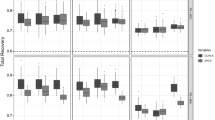Abstract
Sparse PCA is the optimization problem obtained from PCA by adding a sparsity constraint on the principal components. Sparse PCA is NP-hard and hard to approximate even in the single-component case. In this paper we settle the computational complexity of sparse PCA with respect to the rank of the covariance matrix. We show that, if the rank of the covariance matrix is a fixed value, then there is an algorithm that solves sparse PCA to global optimality, whose running time is polynomial in the number of features. We also prove a similar result for the version of sparse PCA which requires the principal components to have disjoint supports.

Similar content being viewed by others
References
Asteris, M., Papailiopoulos, D., Karystinos, G.: Sparse principal component of a rank-deficient matrix. In: Proceedings of ISIT (2011)
Asteris, M., Papailiopoulos, D., Karystinos, G.: The sparse principal component of a constant-rank matrix. IEEE Trans. Inf. Theor. 60(4), 2281–2290 (2014)
Asteris, M., Papailiopoulos, D., Kyrillidis, A., Dimakis, A.: Sparse PCA via bipartite matchings. In: Proceedings of NIPS (2015)
Berk, L., Bertsimas, D.: Certifiably optimal sparse principal component analysis. Math. Progr. Comput. 11, 381–420 (2019)
Bertsimas, D., Tsitsiklis, J.: Introduction to Linear Optimization. Athena Scientific, Belmont (1997)
Boutsidis, C., Drineas, P., Magdon-Ismail, M.: Sparse features for PCA-like linear regression. In: Proceedings of NIPS, pp. 2285–2293 (2011)
Cadima, J., Jolliffe, I.: Loading and correlations in the interpretation of principle compenents. J. Appl. Stat. 22(2), 203–214 (1995)
Chan, S., Papailiopoulos, D., Rubinstein, A.: On the worst-case approximability of sparse PCA. Proceedings of COLT (2016)
d’Aspremont, A., Bach, F., Ghaoui, L.: Optimal solutions for sparse principal component analysis. J. Mach. Learning Res. 9, 1269–1294 (2008)
d’Aspremont, A., Bach, F., Ghaoui, L.: Approximation bounds for sparse principal component analysis. Mathematical Programming Series . 148(1), pp. 89–110
d’Aspremont, A., El Ghaoui, L., Jordan, M., Lanckriet, G.: A direct formulation for sparse PCA using semidefinite programming. SIAM Rev. 49(3), 434–448 (2007)
Dey, S., Mazumder, R., Wang, G.: A convex integer programming approach for optimal sparse PCA. arXiv preprint arXiv:1810.09062 (2018)
Edelsbrunner, H., O’Rourke, J., Seidel, R.: Constructing arrangements of lines and hyperplanes with applications. SIAM J. Comput. 15(2), 341–363 (1986)
Goldberg, A., Tarjan, R.: Finding minimum-cost circulations by canceling negative cycles. In: Proceedings of STOC, pp. 388–397 (1988)
Goldberg, A., Tarjan, R.: Finding minimum-cost circulations by canceling negative cycles. J. Assoc. Comput. Mach. 36, 873–886 (1989)
Hastie, T., Tibshirani, R., Wainwright, M.: Stat. learning Sparsity. CRC Press, Boca Raton (2015)
He, Y., Monteiro, R., Park, H.: An efficient algorithm for rank-1 sparse PCA. In: working paper (2010)
Jolliffe, I., Trendafilov, N., Uddin, M.: A modified principal component technique based on the lasso. J. Comput. Graph. Stat. 12(3), 531–547 (2003)
Journée, M., Nesterov, Y., Richtárik, P., Sepulchre, R.: Generalized power method for sparse principal component analysis. J. Mach. Learn. Res. 11, 517–553 (2010)
Karystinos, G., Liavas, A.: Efficient computation of the binary vector that maximizes a rank-deficient quadratic form. IEEE Trans. Inf. Theor. 56(7), 3581–3593 (2010)
Karystinos, G., Pados, D.: Rank-2-optimal adaptive design of binary spreading codes. IEEE Trans. Inf. Theor. 53(9), 3075–3080 (2007)
Mackenthun, K.: A fast algorithm for multiple-symbol differential detection of MPSK. IEEE Trans. Commun. 42(234), 1471–1474 (1994)
Mackey, L.: Deflation methods for sparse PCA. In: Proceedings of NIPS, vol. 21, pp. 1017–1024 (2009)
Magdon-Ismail, M.: NP-hardness and inapproximability of sparse PCA. Inf. Process. Lett. 126, 35–38 (2017)
Moghaddam, B., Weiss, Y., Avidan, S.: Spectral bounds for sparse PCA: exact and greedy algorithms. In: Proceedings of NIPS, vol. 18, p. 915 (2006)
Motedayen, I., Krishnamoorthy, A., Anastasopoulos, A.: Optimal joint detection/estimation in fading channels with polynomial complexity. IEEE Trans. Inf. Theor. 53(1), 209–223 (2007)
Papailiopoulos, D., Dimakis, A., Korokythakis, S.: Sparse PCA through low-rank approximations. In: Proceedings of ICML (2013)
Schrijver, A.: Combinatorial Optimization . Polyhedra and Efficiency. Springer-Verlag, Berlin (2003)
Shalev-Shwartz, S., Ben-David, S.: Understanding Machine Learning. Cambridge University Press, Cambridge (2014)
Sigg, C., Buhmann, J.: Expectation-maximization for sparse and non-negative PCA. In: Proceedings of ICML, pp. 960–967 (2008)
Sweldens, W.: Fast block noncoherent decoding. IEEE Commun. Lett. 5(4), 132–134 (2001)
Vu, V., Lei, J.: Minimax rates of estimation for sparse PCA in high dimensions. In: Proceedings of AIStats, pp. 1278–1286 (2012)
Yuan, X., Zhang, T.: Truncated power method for sparse eigenvalue problems. J. Mach. Learn. Res. 14, 899–925 (2013)
Zhang, Y., d’Aspremont, A., Ghaoui, L.E.: Sparse PCA: convex relaxations, algorithms and applications. In: Anjos, M., Lasserre, J. (eds.) Handbook on Semidefinite, Conic and Polynomial Optimization. International Series in Operations Research & Management Science, vol. 166, pp. 915–940. Springer, Boston, MA (2011). https://doi.org/10.1007/978-1-4614-0769-0_31
Zou, H., Hastie, T., Tibshirani, R.: Sparse principal component analysis. J. Comput. Graph. Stat. 15(2), 265–286 (2006)
Author information
Authors and Affiliations
Corresponding author
Additional information
Publisher's Note
Springer Nature remains neutral with regard to jurisdictional claims in published maps and institutional affiliations.
This work is supported by ONR grant N00014-19-1-2322. Any opinions, findings, and conclusions or recommendations expressed in this material are those of the authors and do not necessarily reflect the views of the Office of Naval Research.
Rights and permissions
About this article
Cite this article
Del Pia, A. Sparse PCA on fixed-rank matrices. Math. Program. 198, 139–157 (2023). https://doi.org/10.1007/s10107-022-01769-9
Received:
Accepted:
Published:
Issue Date:
DOI: https://doi.org/10.1007/s10107-022-01769-9
Keywords
- Principal component analysis
- Sparsity
- Polynomial-time algorithm
- Global optimum
- Constant-rank quadratic function




